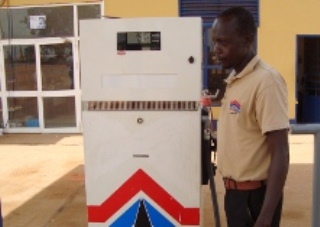S. Sudanese petroleum company slashes prices, seeks to reduce inflation
By Julius N. Uma
March 20, 2012 (JUBA) – Imatongas, a locally-owned South Sudanese petroleum company has announced an 8 percent reduction in fuel prices across the country; an initiative which could positively impact on the country’s inflation rate, now at 42 percent.

Warile Benjamin Warile, the company’s chief executive officer told Sudan Tribune that the 8 percent reduction in fuel costs will improve the economic situation in South Sudan, by reducing local transport costs and commodity prices, in addition to strengthening the company’s position in the market.
“We believe this reduction will contribute positively to the government’s efforts to reduce inflation in the new country. Inflation last month reduced to 42.2 percent compared to 47.83 percent in January after the government streamlined taxation and removed illegal roadblocks and taxes,” he remarked.
The new pricing strategy, Warille said, incorporates changes witnessed in the region in recent months, adding that the unexpected upsurge in fuel prices came in the aftermath of north Sudan’s decision to close it borders with South Sudan in September 2011, forcing the latter to source products from Kenya and elsewhere.
“Since then, lots of changes happened and the prices didn’t change,” he said, urging other petroleum companies in the country to align their pricing with changes in oil prices in other regions.
He urged the government to devise effective mechanisms for regulating hard currency flow from South Sudan to other nations, which is a common practice among local importers of products into the country.
Last month, South Sudan National Bureau of Statistics announces a 3.5 percent reduction in country’s Consumer Price Index (CPI), while annual inflation reportedly fell from 47.8 percent in January to just 42.2 percent in February.
CPI is an index which tracks the price of a representative basket of goods and services consumed by households in South Sudan, with the composition of the goods and services in the basket reflecting average
household consumption in the country.
South Sudan is under severe economic pressure as it shut its oil pipelines in January, in the escalation of a row with Khartoum of the payment of transit fees. South Sudan relies upon oil for up to 98 percent of its revenues.
Juba claims that Khartoum confiscated oil with a market value of US$35 million in lieu of oil transit payments. Juba claims the fee of US$36 per barrel is exorbitant. Negotiations between Juba and Khartoum brokered by the African Union High Level Implementation Panel are yet to achieve a resolution.
(ST)
